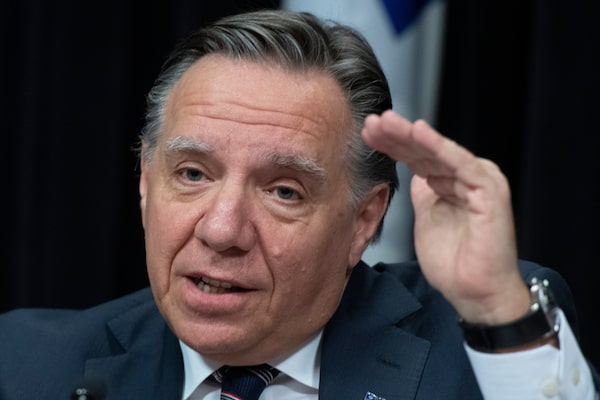
Quebec Premier Francois Legault speaks at the legislature, in Quebec City, on March 12, 2020.Jacques Boissinot/The Canadian Press
Quebec Premier François Legault has banned public gatherings of more than 250 people and ordered into quarantine any public servants who return from outside the country, saying it’s time for the province to go into “emergency mode.”
Mr. Legault announced new measures Thursday to arrest the spread of COVID-19 as the province saw an increase of cases to 13 from nine.
He suggested anyone returning from travel outside the country, including the United States, should follow the 14-day self-quarantine guidelines and asked employers to be understanding. The quarantine is mandatory for public servants, including daycare workers and teachers, coming back from travel. “All of Quebec needs to go into emergency mode,” Mr. Legault said. “Our challenge in the next few weeks is to slow down the contagion.”
The ban on gatherings took effect immediately. Mr. Legault said the 250-person limit is based on probabilities calculated by public-health officials.
Mr. Legault, who will speak with his provincial counterparts and Prime Minister Justin Trudeau on Friday, said Ottawa should “seriously consider” closing the borders to prevent accelerating the spread of illness from outside Canada.
The Premier, who was flanked by his health minister and chief public-health officer, said he is not ready yet to shut down schools or postsecondary institutions, but that schools should close lecture halls and cafeterias with more than 250 people.
Horacio Arruda, Quebec’s director of public health, said all of Quebec’s confirmed cases came from outside Canada but broader measures may be put in place when the virus spreads within the province. “We are acting on the basis of the information we have, our own epidemiology, that isn’t the same as in British Columbia or Ontario,” he said. “When we start having infections within communities, we may well close schools.”
Dr. Arruda added that he has not ruled out quarantining specific areas such as Montreal, where people live in greater density than the rest of the province, but right now the cases are scattered around Quebec. “Every scenario is possible,” he said. “We will take all steps that are logical.”
Health Minister Danielle McCann said the province currently has 900 specialized beds suitable for COVID-19 treatment. The province has started to gradually free up beds by postponing non-essential procedures, she said.
The Premier and his health officials said the goal of the measures is to slow down the spread. “We are impinging a little on individual rights but it’s for the collective good,” Dr. Arruda said. “We have to call for solidarity from one and all.”
Dr. Arruda said people should think twice about any gathering that doesn’t fall under the ban announced Thursday. He suggested workers should try to avoid rush hour on public transit and avoid visiting people in personal-care homes if the visitor has a hint of illness.
A reporter asked Dr. Arruda if the measures should have taken place earlier, given Quebec’s spring break took place in the first week of March and thousands returned from trips last weekend. “Most countries only took these steps after they had thousands of cases,” he said. “Momentum and social acceptability is a factor here. People are ready. They’ve seen what’s happened elsewhere.”
Mr. Legault said Quebeckers should expect some difficult weeks and months ahead. “I know I’m asking a lot,” he said. “But if we are going to succeed, we are going to need the help of all Quebeckers.”
Our Morning Update and Evening Update newsletters are written by Globe editors, giving you a concise summary of the day’s most important headlines. Sign up today.
Health Minister Patty Hajdu says the World Health Organization's declaration of a global COVID-19 pandemic doesn't change Canada's approach to fighting the virus. She says Canada has been preparing for the worst case scenario, and it will stay on its current course.
The Canadian Press